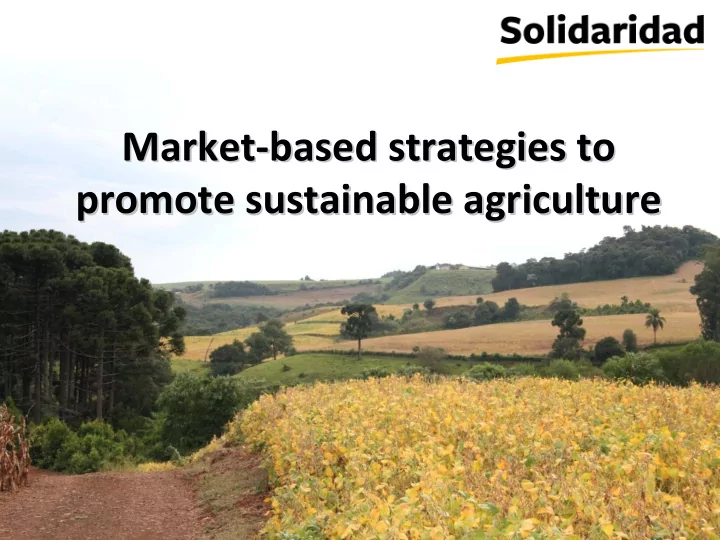

Market ‐ ‐ based strategies to based strategies to Market promote sustainable agriculture promote sustainable agriculture
Solidaridad • Development Foundation of Dutch origin • Launched in 1969 by the Catholic and Protestant Dutch churches for development aid in Latin America • In the 1980’s, World pioneer in the development of fair trade products • In the 1990’s and 2000’s, increased scope ‐ fair and sustainable supply chains from producer to consumer, created through fair trade and corporate social responsibility. • Different labels and engagement in multi ‐ stakeholders initiatives (round ‐ tables) • In 2000’s, no more ties to the churches • Creation of the Solidaridad Network
Solidaridad chains of coffee, tea, cotton, cocoa, gold, soy, palm oil, sugarcane and tropical fruits Regional offices in Europe, Asia, Africa and Latin America
Brands and labels work to change sectors EKO – Organic MAX HAVELAAR – Fair Trade Consumers Consumer Utz Certified Good Inside – Coffee, cocoa, tea labels SA 8000 – Clothing, footwear Retail and Corporate Fair Wear – Clothing Social brands Responsibility – 4C: Common Code for the Coffee Community Round Tables – RSPO: Palm oil Sectors and – RTRS: Soy Industry Codes - BSI: Sugar cane - BCI: Cotton regulation
Solidaridad initiatives
Solidaridad active engagement in roundtable
Solidaridad works throughout the value chain Exporters Companies Consumers Producers Training Sustainable Traceability of Import, Sustainable o o o o o Self ‐ production sustainable processing & consumption o organization products marketing Awareness o Certification Improved Corporate social raising o o o Market access trading responsibility Labels o o conditions Producer capacity Civil society Match making building communication Developing sustainable supply chains with multiple stakeholders
Brazilian Sustainable Soybean Family Farming � 800 farmers � 10-30 ha farms � Family labor � Food and cash crop production (no monoculture) � Adding value on the farm (processing) � Environmental preservation � Food sovereignty in the region
Smallholder soybean farmers in Brazil Family Farms Large farms Soy Brazil 164.011 51.966 Estabelecimentos Quantidade produzida 6,404 34,308 (mi/t) 2,707 12,939 Área colhida (mi de ha) Valor da produção 2,891 14,249 (bi de R$) Censo Agropecuário 2006 do Instituto Brasileiro de Geografia e Estatica (IBGE), a Agricultura Familiar é responsável por 16% da produção de soja no País.
Partners of the project • Gebana/Coopafi: joint project helping family farmers growing towards RTRS certification level • Backed by Solidaridad, WWF and RTRS through co- funding of development process • Dutch dairy giant FrieslandCampina and Keurslagers (quality butchers association) OTHER current clients
Outcomes • Certificates for responsible soybean : � Independently audited proof � 55 criteria verified: 37 minor, 13 major, 5 disqualifying � Non-GM soy produced by produced family farmers � Guaranteed no slave labor, no child labor, no deforestation
Responsible Family Soy Farming KEURSLAGER
Certification bottlenecks for family farms • Economies of scale • Lack of education • Poor technology • Lack of capital • Group certification • Group organization
Certification opportunities for family farms • Access to (new) markets • Access to technical support • Access to organizational support • (Increased) access to credit • Improved productivity • Improved efficiency • Better terms of trade
European Brand Support to Family Soy Farming KEURSLAGER
Indian Sustainable Family Farming � 0.5 - 2 ha farms � Family labor � Food and cash crop production (no monoculture) � No child labor � Reduction of pesticides � Environmental preservation � Food sovereignty in the region
Why companies engage • Reduce reputation risk – Avoid being linked to bad practices by linking to good practices • Social licence to operate – Contribute to local development – Be able to show your commitment to shareholders, clients and general public • Guarantee a responsible supply chain • Be among the early movers
Name and Shame Campaings Market campaigns to “name & shame” com- panies with social & environmental problems (To be Niked)
Why Does Business Engage The Soybean Case
Beyond Certification Initiatives REQUALIFICATION PROGRAM FOR SUGARCANE RURAL WORKERS
Objectives of the program Training and requalifying 3,500 cane cutters and community members per year for jobs in the sugar mills, ethanol plants and to work in other sectors, as a response to the process of mechanizing the sugarcane harvest to eliminate burning.
Thank You! Year report on www.solidaridadnetwork.org
Recommend
More recommend